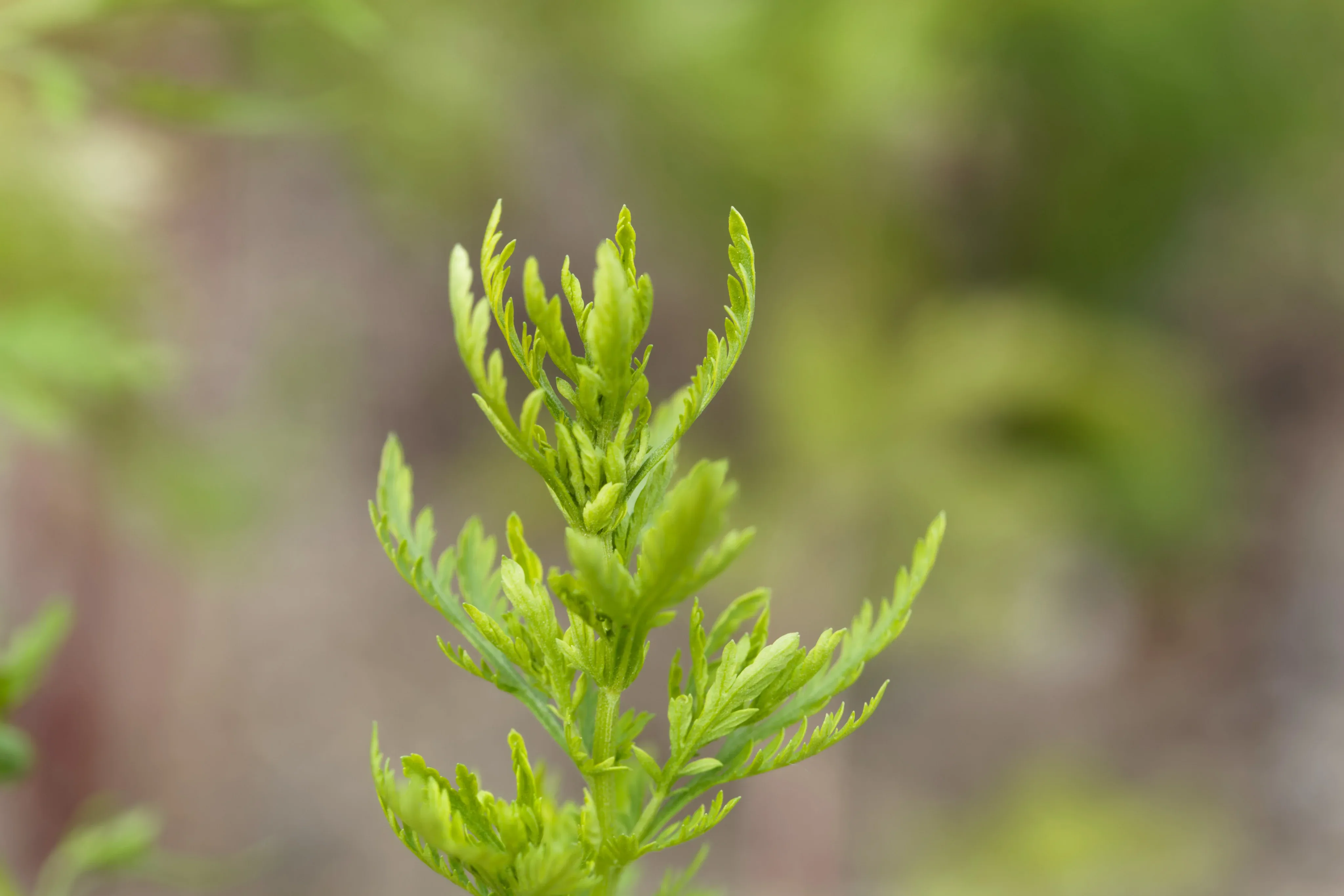
Annual Mugwort (Artemisia annua) is an aromatic annual herbaceous plant from the aster family (Asteraceae). It is distinguished as an excellent and important source of clinically proven therapeutic compounds. Artemisia annua produces a variety of complex terpenoids in its trichomes, with artemisinin being of particular interest for treating various ailments. The stem of annual mugwort can grow up to 1.5 meters tall, is upright, and highly branched, especially toward the top. The lower leaves are large, while the upper leaves become progressively smaller. The flower heads are elliptical, attractive, and almost drooping, and the plant flowers from July to October. This species of annual mugwort is native to Asia and is commonly found as part of the natural vegetation in the northern regions of Chahar and Suiyan provinces in China. Today, the herb is mainly cultivated in Argentina, Australia, Bulgaria, France, Hungary, Italy, Spain, North America, and Russia.
Annual Mugwort (Artemisia annua) – a little history
In traditional Chinese medicine, annual mugwort has been used for over two thousand years to treat fever and over a thousand years to treat malaria. The Chinese name for the plant, "Qing Hao," means "green plant." The earliest evidence of the herb's use for treating fever and malaria comes from a document titled Prescriptions for Fifty-Two Diseases (Wu Shi Er Bing Fang), at least two thousand years old, discovered in 1973 in a tomb at Ma Wang Dui in Changsha. In the 4th century, the medicinal use of annual mugwort was described in the Chinese Handbook of Prescriptions for Emergencies. In ancient Greece, the plant was dedicated to Artemis, the virgin goddess of hunting. In ancient Egypt, the Artemisia plant was used by the fertility goddess Bastet as a love charm. According to another legend, the herb is named after Queen Artemisia, who ruled Halicarnassus (modern-day Bodrum). In the Middle Ages, the use of annual mugwort as a medicinal herb was documented by Hildegard of Bingen, who emphasized the herb's external applications.
Health Benefits of Annual Mugwort
HEALTH BENEFITS
Antimalarial Effect
The history of annual mugwort demonstrates how herbal remedies can have a significant impact on the future of medicine. In the 1970s, Chinese scientists rediscovered the power of the Artemisia plant while searching for a herbal remedy for malaria. In 1972, Professor Tu Youyou extracted the active ingredient artemisinin from annual mugwort. In 2015, she received the Nobel Prize in Physiology and Medicine for demonstrating the plant’s efficacy as an antiparasitic agent, which has since saved millions of lives in the fight against malaria and tropical diseases. In response to increasing resistance to antimalarial drugs, the World Health Organization recommended combination therapies containing artemisinin derivatives.
Artemisinin itself represents a new class of antimalarial drugs that kill all protozoan organisms of the Plasmodium genus that cause malaria in its earliest stages. Artemisinin and its derivatives are toxic to the malaria parasite at nanomolar concentrations, causing specific structural changes to the cell membrane in the erythrocyte phase that kill the parasite. Artemisinin contains a peroxide group that reacts with hemozoin (insoluble iron), and it is believed this reaction leads to the formation of free radicals that attack parasitic proteins, thereby killing the organisms. Artemisinin and its derivatives have become crucial in treating malaria, as resistance to quinine and other antimalarial drugs has become very high.
Anticancer Effect
Today, the scientific community pays close attention to the potential anticancer properties of annual mugwort. The cytotoxic activity of nine terpenoids and flavonoids isolated from Artemisia annua has been tested in vitro on several human tumor cell lines. Artemisinin and one of its metabolites, dihydroartemisinin, exhibit significant cytotoxicity against P-388, A-549, HT-29, MCF-7, and KB tumor cells. The anticancer effect is attributed to the formation of free radicals from artemisinin that cause molecular damage, leading to cancer cell death without harming healthy cells.
Antiparasitic Effect
A widespread use of annual mugwort is to eliminate intestinal parasites, especially nematodes—a type of roundworm that settles in the intestine and can cause gastrointestinal discomfort, chronic fatigue syndrome, bruxism, severe anal itching, shortness of breath, fever, anemia, and weight loss. Clinical studies suggest that annual mugwort can disrupt the life cycle of parasites.
Beyond its activity against Plasmodium, artemisinin has a potentially lethal effect on other protozoan organisms. Studies show that artemisinin is effective against Toxoplasma gondii, which causes toxoplasmosis; Leishmania major, which causes leishmaniasis; and species of Babesia, which cause anemia-like diseases in humans and animals.
Antiviral Effect
Scientists at the Max Planck Institute in Potsdam and virologists at the Free University of Berlin (FU Berlin) have studied the properties of annual mugwort against COVID-19 infection. Their research aimed to discover whether and how extracts of annual mugwort work against the coronavirus. The results surprised the researchers: extracts from the Artemisia plant proved particularly effective against SARS-CoV-2. The strongest antiviral effect was observed with the water-ethanol extract from the leaves of annual mugwort. This antiviral effect was even stronger when coffee was added. Based on these results, researchers believe that extracts of annual mugwort could provide an effective, readily available, safe, and affordable approach to combating SARS-CoV-2 (COVID-19) infections.
USAGE AND DOSAGE
Annual mugwort is often consumed in the form of teas, capsules, and tinctures. The dosage may vary depending on the product and intended use. It is advisable to consult a holistic doctor, naturopath, or health expert before using annual mugwort.
POSSIBLE SIDE EFFECTS
Annual mugwort is considered safe when used in recommended doses. Pregnant and breastfeeding women should consult a doctor before use.
With natural care and the power of essential oils, your summer can be carefree and wonderfully fragrant!
08 July 2025 | Blog
30 April 2025 | Blog
21 March 2025 | Blog